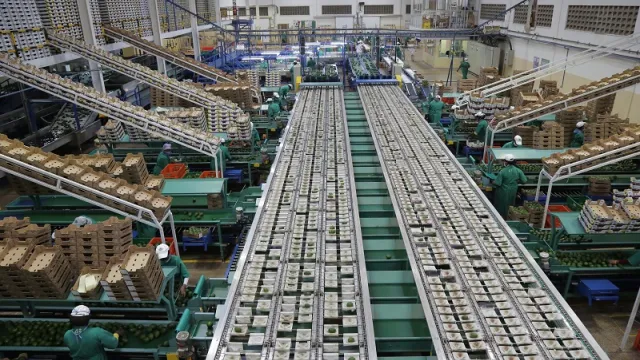Kakuzi’s grit shows agriculture stocks could change NSE outlook

Kakuzi’s grit shows agriculture stocks could change NSE outlook
For over a decade, Kakuzi has consistently delivered in profits, dividends and returns to thousands of farmers in Kenya.
Since its establishment, the agricultural cultivation and manufacture company has employed thousands and paid a fair share of tax to the government.
Even during the Covid-19 pandemic economic fallout in 2020, with pre-tax profit of Kes 848 million, the firm recommended an increase in dividend per share to Kes 18, compared to Kes 14.00 in 2019.
It paid farmers a total of Kes 58 million and employed 2,600 workers per day, which translated to 750,000 employee days in the year.
“We were also able to continue with our economic empowerment commitment to the many small holders who we purchase fruit from. A total of Kes 58 million (85 per cent of the net returns) was paid out to farmers in December 2020,” Kakuzi new board Chairman Nicholas Ng’ang’a said.
During the pandemic year, most companies in Kenya’s industry saw a sharp decline in profits, and many firms subsequently cut dividends, fired their workers even as the exchequer booked reduced taxes.
Read also: Fresh reforms promise high returns for milk farmers
Kakuzi just like the other five agricultural counters: Kapchorua, Limuru Tea, Eaagads, Sasini and Williamson at the Nairobi Securities Exchange (NSE) are not dominant players in the country’s bourse.
The big boys at the NSE are telco giant Safaricom, bankers Equity and the Kenya Commercial Bank (KCB), Cooperative Bank as well as alcohol maker the East African Breweries Limited (EABL)—who jointly account for over 81 per cent of activity at the trading floor.
But these overlooked agriculture counters held up last year and save for Limuru Tea, they gained in share prices and therefore return on equity.
In 2020, Kakuzi share gained 13 per cent, Kapchorua (2.4 per cent), Eaagads (19.1 per cent) and Williamson (7.9 per cent).
According to fruit exporter, Kakuzi, their resilience has been in diversity since it grows and exports tea, avocado and macadamia, which is unique to agricultural companies and this product mix helped them navigate a fairly difficult trading period.
Globally, avocados have become the new green gold with surging demand especially in the export markets where they fetch quite lucrative returns.
Despite the fact that the pandemic created significant disruption on European markets with the almost complete closure of the food service supply chain, the demand for avocados remained resilient through the retail segment and it was able to take up comparably high volumes.
Kakuzi says both avocado and macadamia had higher export volumes than recorded in 2019, which helped mitigate a significant reduction of 34 per cent in the price of avocados.
On the back of exceptionally high rainfall experienced in Kenya, avocado export volumes were 27 per cent up on 2019.
Cold chain logistics also operated well during the season despite the enormous challenges that the pandemic placed on cross border logistics trade.
The firms’ Chairman said Kakuzi will this year invest more than Kes400 million in capital expenditures while focusing on upscaling its smallholder operations value to complement its production capacities and boost the global positioning of Kenyan avocados.
He said avocado remains in its strategic view while balancing demand abroad and growing locally and regionally.
In the period, "the markets for Kakuzi's avocados remained solid, despite the almost complete closure of the food retail sector across our main markets. We expect that there will be some recovery in 2021, but this is not guaranteed. To mitigate this, we continue to trade with our traditional buyers as well as some key new players across 14 different countries," Mr Ng'ang'a added.
Even as the company repositions, it is still battling with the rear-ender effects of a suit brought against it that ruffled confidence in the management and their range of products.
In recent years, the European markets have become sensitive to how workers are treated since they want ethical products causing no harm to communities that produce the products.
The firm was hit with legal and reputational costs, fighting a UK law firm that invited Kakuzi into the jurisdiction of the United Kingdom but the suit was dropped in July 2020.
The move, however, did not stop internal reviews to build investor and customer confidence.
The company has since developed an Operational-Level Grievance Mechanism (OGM) to enhance the timely and sensitive resolution of grievances that any of its employees or stakeholders may have with the firm.
It also achieved a milestone in its pursuit of corporate governance excellence by publishing its first Environment, Social and Governance (ESG) Report.
"As a Board, we acknowledge that such processes are a critically important journey where one strives to reach new standards continuously. The next ESG report will be published later on this year," Mr Ng’ang’a assured.
The firm also got a thumbs up from the Ethical Trade Initiative (ETI) acknowledging the commitments Kakuzi has made on labour rights.



